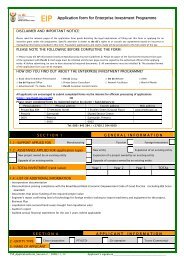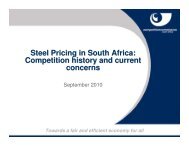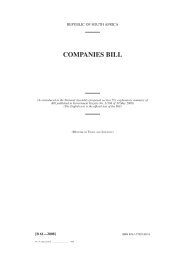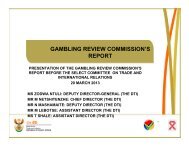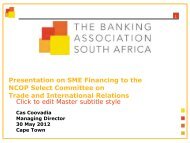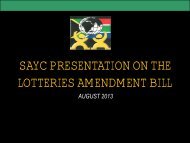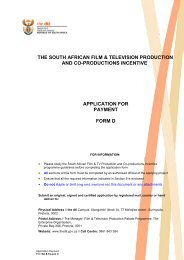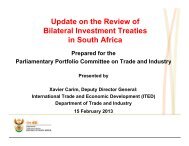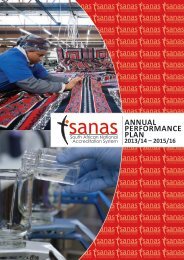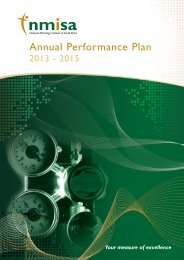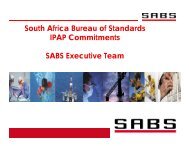Copyright Review Commission Report - ICT Law and Regulation ...
Copyright Review Commission Report - ICT Law and Regulation ...
Copyright Review Commission Report - ICT Law and Regulation ...
- No tags were found...
You also want an ePaper? Increase the reach of your titles
YUMPU automatically turns print PDFs into web optimized ePapers that Google loves.
6.1.3. The CRC’s assessment of the appropriateness of the accreditation for these societies, based on therequirements of the regulations, revealed the following cases of non-compliance:6.1.3.1. In terms of <strong>Regulation</strong> 3 (3) (d) of the Collecting Society <strong>Regulation</strong>s, “The Registrar is satisfied that theapplicant is able to comply with the obligations set out in these regulations.” SARRAL’s audited annualfinancial statements for the year ended 31 December 2003 <strong>and</strong> for the year ended 31 December 2005were issued in June 2005 <strong>and</strong> October 2006 respectively. This was a contravention of Section 304 of theCompanies Act of 1973 (as amended). Based on this, it would have been incorrect to assume thatSARRAL was going to be able to comply with <strong>Regulation</strong>s 4 (3) (e), if it was already not complying with theCompanies Act. <strong>Regulation</strong> 4 (3) (e) requires the accredited collecting societies to issue the auditedfinancial statements within six months after the end of the financial year. Therefore, it was inappropriate toaccredit a collecting society with a track record of non-compliance.6.1.3.2. According to <strong>Regulation</strong> 3 (3) (g), “The Registrar is satisfied that the accreditation of the applicant does notconflict with, undermine or diminish the adequate, efficient <strong>and</strong> effective administration of the right toreceive payment of a royalty in terms of Section 9A of the <strong>Copyright</strong> Act, 1978, or Section 5 (1) (b) of thePerformers’ Protection Act, 1967, as undertaken by a collecting society already accredited <strong>and</strong> establishedunder the <strong>Copyright</strong> At, 1978.” SAMRO was accredited as the performers’ collecting society. The copyrightowners for the sound recordings are the sound producers <strong>and</strong>, accordingly, the performers cannot assignthe rights they do not own. Therefore, SAMRO would not be able to license the sound recordings rights tothe users <strong>and</strong>, accordingly, could not function independently (as a performers’ collecting society for soundrecording) without relying on another collecting society m<strong>and</strong>ated by the sound producers. Although<strong>Regulation</strong> 3 (1) (b) allows for the performers’ collecting societies to exist, such societies cannot operateindependently. <strong>Regulation</strong> 6 (2) (a collecting society may not retain more than 20% of the total collections)does not deal with the situation where more than one collecting society is involved in one collectingtransaction. Due to the above-mentioned complication, this requirement could not be fulfilled.6.1.3.3. SAMPRA, as a collecting society for the sound producers, is entitled to issue licences, collect royalties <strong>and</strong>distribute them to its members, but has no responsibility towards the performers. With regard to theperformers, SAMPRA can either transfer the performers’ portion to a performers’ collecting society ordistribute the share via the sound producers. Transferring funds from one collecting society to another isinefficient because the collection costs could potentially double. Distributing the performers’ share via thesound producers is risky <strong>and</strong> inappropriate because the conduct of the sound producers is not regulated.6.1.4. Based on the above assessment, it is clear that in accrediting the sound recording collecting societies, the levelof compliance was less than satisfactory. The most concerning case is in respect of SARRAL, which wasaccredited despite the fact that it had received a qualified audit report for three consecutive years, had failed tocomply with the Companies Act with regard to the issuance of the audited financial statements, <strong>and</strong> had apending case about its financial status. The lesson arising from this saga is that a comprehensive investigationis required before any accreditation process can be concluded.6.1.5. The accreditation of SAMPRA <strong>and</strong> SAMRO resulted in a court case involving the Registrar, SAMPRA <strong>and</strong>SAMRO regarding the distribution of the performers’ share of royalties. As a result, no distributions have beenmade for needletime royalties.- 44 -



